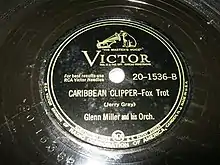| "Caribbean Clipper" | |
|---|---|
 | |
| Song by The Glenn Miller Orchestra | |
| A-side | "Blue Rain" |
| Released | 1943 |
| Genre | Big band, jump blues |
| Length | 2:45[1] |
| Label | Victor |
| Composer(s) | Jerry Gray |
| Lyricist(s) | Sammy Gallop |
"Caribbean Clipper" is a big band and jump song recorded by Glenn Miller and his Orchestra in 1942. The song was composed by Jerry Gray with lyrics by Sammy Gallop.[1] The song was part of a number of songs—including "Sun Valley Jump", "Here We Go Again", "The Spirit Is Willing", "The Man in the Moon" and "A String of Pearls"—written by Gray, a member of the Glenn Miller Orchestra as an arranger, specially for Glenn Miller,[2] who recorded it in 1943.[3] The song was registered with the United States Copyright Office on October 23, 1942, by the Mutual Music Society.[4]
Recordings
Glenn Miller
Miller recorded a number of versions of the song, some of which were broadcast on radio programs such as his Chesterfield Broadcasts in 1942.[5] He released the song through Victor in 1943, as the B-side to "Blue Rain".[6] This recording featured Maurice Purtill on drums and Mel Powell on piano.[1] Billboard magazine ran an advert for the release that stated that "no hep nickel will miss this one!".[6] Miller made a recording for the Treasury Star Parade—syndicated by the United States Department of the Treasury[7]—on February 11, 1944.[8] This recording was included on Magic Records' compilation The Glenn Miller Service Orchestra in the USA and Europe (Volume II).
Miller also recorded a version of the song directly for broadcast on CBS Radio's I Sustain the Wings show. The recording was made at the war bond rally at the Chicago Theatre on April 15, 1944.[9]
Miller later recorded the song in Studio One[10] at Abbey Road Studios (then known as EMI Studios) on November 27, 1944, as part of a propaganda broadcast. Recorded under the name "The American Band of the Allied Expeditionary Force", the session became Miller's last recording session before his disappearance.[11][12] The broadcast was later issued on a number of albums as The Lost Recordings.[13][14]
Personnel
The personnel for Miller's Abbey Road recording were:[15]
- Brass
- Zeke Zarchy (trumpet)
- Bernie Privin (trumpet)
- Bobby Nichols (trumpet)
- Whitey Thomas (trumpet)
- Jack Steele (trumpet)
- Jimmy Priddy (trombone)
- John Halliburton (trombone)
- Larry Hall (trombone)
- Nat Peck (trombone)
- Addison Collins (french horn)
- Woodwind
- Hank Freeman (alto saxophone)
- Peanuts Hucko (alto saxophone, tenor saxophone, clarinet)
- Vince Carbone (tenor saxophone)
- Jack Ferrier (tenor saxophone)
- Freddy Guerra (alto saxophone)
- Manny Thaler (baritone saxophone, alto saxophone, bass clarinet, clarinet)
- Piano
- Guitar
- Double bass
- Drums
A number of strings musicians were part of the ensemble,[15] but the song's orchestration did not require their performance.
Other versions
In August and September 1950, a band led by Gray—billed as the "Ex-Glenn Miller Men" and including musicians such as Willie Schwartz, Jimmy Priddy and Johnny Best—performed the song at the Hollywood Palladium; a recording of the concert was released through Jazz Hour Records.[16] The song was performed by the BBC Big Band as part of their Glenn Miller tribute concert at Birmingham Town Hall on November 14, 2011.[17] Other artists to record versions of the song include the Syd Lawrence Orchestra[18] and Joe Loss.[19]
References
- 1 2 3 "Caribbean Clipper". Lush Music. Retrieved June 16, 2012.
- ↑ Simon, George T. (1974). Glenn Miller and His Orchestra. New York: Crowell. p. 455. ISBN 0690004702.
- ↑ "The Billboard". Billboard Magazine. 55 (29): 25. 17 July 1943. ISSN 0006-2510. Retrieved June 16, 2012.
- ↑ United States Copyright Office (1942). Catalog of copyright entries: Musical compositions, Part 3. Washington, DC: Library of Congress. p. 1547.
- ↑ "International Association of Jazz Record Collectors Journal". Google Books UK. International Association of Jazz Record Collectors. 1 January 1986. Retrieved 28 September 2016.
- 1 2 "The Billboard". Billboard Magazine. 55 (29): 64. 17 July 1943. ISSN 0006-2510. Retrieved June 16, 2012.
- ↑ Haendiges, Jerry. "Series: "TREASURY STAR PARADE"". Jerry Haendiges Vintage Radio Logs. Retrieved July 6, 2012.
- ↑ "Glenn Miller Army Air Force Band In The U.S.A. 1943-1944". Lowell's Place. Archived from the original on April 16, 2015. Retrieved July 6, 2012.
- ↑ GLENN MILLER and his Army Air Force Orchestra—War Bond Rally Chicago Theatre, Jasmine Records
- ↑ Kendall, Ted. "Glenn Miller: The Lost Recordings". Tarcl. Retrieved 6 July 2012.
- ↑ "Missing Chapters, Vol. 5: The Complete Abbey Road Recordings". AllMusic. Retrieved June 16, 2012.
- ↑ Butcher, Geoffrey. "Glenn Miller: The Lost Recordings". Tarcl. Archived from the original on 12 March 2017. Retrieved 6 July 2012.
- ↑ "The Lost Recordings [#1]". AllMusic. Retrieved 6 July 2012.
- ↑ "Glenn Miller The Lost Recordings". Parabrisas. Archived from the original on June 15, 2011. Retrieved July 6, 2012.
- 1 2 Palmer, Hugh. "Liner Notes: Personnel". Tarcl. Retrieved July 6, 2012.
- ↑ "Ex-Glenn Miller Men: Live from the Hollywood Palladium (1950)". AllMusic. Retrieved June 16, 2012.
- ↑ "Big Band Special". BBC. Retrieved 16 June 2012.
- ↑ "Syd Lawrence Orchestra, The – Miller Magic". Discogs. 1970. Retrieved June 16, 2012.
- ↑ "Joe Loss – Joe Loss In The Glenn Miller Mood". Discogs. 1973. Retrieved June 16, 2012.